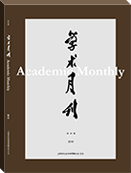Between Human Society and Buddhism—— Local Cooperators’ Ethic Dilemma and Its Extrication in Early Qing Dynasty
Abstract: At the turn of Ming and Qing Dynasties, the local gentry, faced with the powerful invasion of Qing army, there are less adherents of Ming Dynasty than cooperators of the new dynasty, either being active or passive. But a universal cardinal guides and virtues make a heavy ethic pressure upon the cooperators, which brings about a scene of man’s living space compressed or destroyed by the respected ethic value. The local gentry struggling in such a dilemma arduously constructs its reason for living to save a meaning of life, to relieve psychological pressure with a multiple value identity, which shows a very important scene in the history of ideas and psychology of the gentry at that time. The aim of Confucian scholars to construct the universal cardinal guides and virtues is for the people and for the times to come, but at the turn of dynasties, the complicated political reality makes the ethical practitioners fail for the peace, while the cooperators seems to help set up the social order which the civilians needed and, in this way, the distinction of ethic values between the Han and minorities, between fidelities turns to be blurred



 沪公网安备 31010102003103号
沪公网安备 31010102003103号 DownLoad:
DownLoad: